Get a free story when you subscribe
Menu
 Last week, while the Husband and I walked around the neighborhood, a flash of red against black and white caught my eye. It was so unusual that I had to stop and get a better look at the bird. It turned out to be a woodpecker. Not just any woodpecke
Last week, while the Husband and I walked around the neighborhood, a flash of red against black and white caught my eye. It was so unusual that I had to stop and get a better look at the bird. It turned out to be a woodpecker. Not just any woodpecke r… It was a “Woody the Woodpecker” kind of woodpecker.
r… It was a “Woody the Woodpecker” kind of woodpecker.
I had never seen this type of bird in the wild before and I was thrilled. It’s been a while since I’ve encountered new-to-me wildlife. This was so unexpected. Of course, I could not remember what kind of woodpecker it was. Thus, when I got home, I googled it.
Normally, I use udm14.com. I don’t like AI in my searches. I find UDM14 to be a lot cleaner and more correct. I forgot this time. What popped up for me when I asked Google?
A northern flicker (See below).
Once again, AI reared its ugly head and was wrong. Now, I know what a northern flicker looks like, and it does not look like Woody the Woodpecker. But, if I hadn’t already known, I could’ve walked away with incorrect information and been none the wiser.
Look, in certain circumstances, the pattern recognition of a LLMs is amazing. Especially in medical fields, and I imagine, in programming. However, you need to have a good foundation of knowledge before you can trust whatever AI comes up with.
As it stands now, in everyday life, AI is a travesty. Too many times, it is wrong—as in it guessed wrong. There’s no hallucinating going on. It would not get a passing grade in school. Yet, people trust its answers all the time. I wish to goodness AI was actually trustworthy. It’s not.

BTW, the correct answer is: Woody the Woodpecker is based on the Pileated Woodpecker.

I guess this is your old woman yells at clouds moment for the day.

 I love writing short story horror because the swing of ideas can be boundless even within a single book. You can be transported from modern settings to my favorite: Gothic backdrops. There is something spectacularly spooky about old weather-worn, eerie mansions, houses, and the time period itself. The creak of floorboards, the chill in the air, the distant tolling of a bell—those are the sounds echoing in your mind long after the last page is turned. These decaying structures hold secrets in every shadowed corner, and it’s easy to imagine their walls remembering every scream, whisper, or tragedy that’s ever unfolded within.
I love writing short story horror because the swing of ideas can be boundless even within a single book. You can be transported from modern settings to my favorite: Gothic backdrops. There is something spectacularly spooky about old weather-worn, eerie mansions, houses, and the time period itself. The creak of floorboards, the chill in the air, the distant tolling of a bell—those are the sounds echoing in your mind long after the last page is turned. These decaying structures hold secrets in every shadowed corner, and it’s easy to imagine their walls remembering every scream, whisper, or tragedy that’s ever unfolded within.
What fascinates me most is the way horror allows you to explore deep-rooted fears through different lenses. One moment, you are in a suburban neighborhood where things seem normal, until they go wrong. The next, you are wandering through fog-choked moors toward a crumbling estate that feels alive. The flexibility of short horror fiction means you do not need hundreds of pages to unsettle someone; a single well-placed sentence, a twist of imagery, or the slow reveal of something deeply wrong can do the trick. That brevity forces you to be sharp, precise, and atmospheric—every word counts, and every detail needs to serve the chill.
To me, the Gothic setting in particular is ripe with symbolism. The decay of the building often mirrors the decay of the soul or mind. Rain lashes the windows like ghostly fingers trying to get in. Candles flicker in halls where no wind should reach. These are the environments where shadows do not behave quite right, where time feels slowed or twisted. I love tapping into the classic themes of madness, isolation, fear of the dark, haunted objects, etc.—but presenting them in new ways that still honor the roots of the genre.
Writing these stories also feels like being in conversation with the greats—Poe, Lovecraft, Shirley Jackson. (I take great pride in mimicking the Gothic period language for many of my stories.)
Each one of the greats brought their own flavor to horror, and I strive to do the same. Whether it is a haunted diary, a malevolent mirror, or something unspeakable lurking beneath the floorboards, I want to leave readers with that lingering feeling of unease. The kind that stays with you in the quiet moments. The kind that makes you hesitate before turning off the light.
Ultimately, I think short form horror reminds us, in a snapshot version, of the unknown all around us. It plays with our sense of safety and dares us to look closer. And I cannot get enough of it.
—
Mark K. McClain is a multi-award-winning author who discovered his love of writing as a pre-teen, inspired by the works of J.R.R. Tolkien, David Eddings, Isaac Asimov, Robert Jordan, Agatha Christie, Stephen King, and many others. His 20-year military career carried him around the globe, experiences that enriched his worldbuilding and grounded his stories in realism.
Beyond fiction, he has published a wide range of outdoor-themed and human-interest articles, from local history features and parenting columns to international pieces written in China and Uganda. He writes fantasy, science fiction, and Gothic horror—and sharing the magic of storytelling remains one of his greatest joys.
Mark makes his home on an island off the coast of Washington State with his life partner, Rochelle, and their beloved furry companions.

The world is a scary place right now for a lot of people. Me included. I fear for friends, family, and other loved ones. Hell, I fear for myself, my gender, and the erosion of my rights, not to mention the loss of my bodily autonomy. Every single time I look up from my work—focused writing or editing—to look at social media or the news, I regret it.
So, I have a couple of words for you to noodle over. I collect new-to-me, interesting words. I’ve been saving these since the beginning of the year for the right time to trot them out. I think now is as good of a time as any.
The first is: Weltschmerz (translated as something like world-sadness). It is a German word that means the feeling of melancholy and pessimism that comes from being aware of the contrast between the way things are and the way you wish they were.
The second is: Sisu. It is a Finnish word that means a special strength and determination to continue on in moments of adversity; having grit, bravery, and resilience; refusing to give up.
These days, I live between these two words. The world feels like a trash fire right now—and my state is actually on fire, literally—and, sometimes, I wonder how we are going to survive as a people, much less a nation.
The only saving grace I have is the fact that every single generation believes they are in the end times, that men aren’t masculine enough, women aren’t feminine enough, and no one wants to work…along with a litany of other societal woes, as seen in letters to the editor, essays, journal entries, and the like for over 2500 years, and we’re still here.
We all feel weltschmerz at some point in our lives. Then, we feel sisu. And life goes on. We hope. I hope.
There. A couple of words for you to ponder in the coming days.


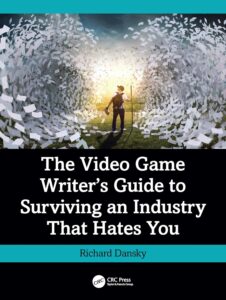 I have been writing video games for over a quarter of a century, which, in hindsight, is kind of terrifying. I have seen games go from teams of a dozen being “maybe too big” to working on teams with a thousand developers spread out across a half-dozen countries and an equal number of time zones. I have gone from writing wall-of-text mission briefings because we couldn’t put dialog in the actual gameplay to games where we literally had to write well over a hundred thousand lines of just systemic dialog, never mind the stuff related to the plot and the characters. I have seen game writing grow from a last-minute “oh, the designer will do it in their spare time” afterthought to a distinct role. And I have seen nonsense the likes of which you would not believe, and which I ultimately decided maybe somebody should say something about, to keep it from happening again (and again and again).
I have been writing video games for over a quarter of a century, which, in hindsight, is kind of terrifying. I have seen games go from teams of a dozen being “maybe too big” to working on teams with a thousand developers spread out across a half-dozen countries and an equal number of time zones. I have gone from writing wall-of-text mission briefings because we couldn’t put dialog in the actual gameplay to games where we literally had to write well over a hundred thousand lines of just systemic dialog, never mind the stuff related to the plot and the characters. I have seen game writing grow from a last-minute “oh, the designer will do it in their spare time” afterthought to a distinct role. And I have seen nonsense the likes of which you would not believe, and which I ultimately decided maybe somebody should say something about, to keep it from happening again (and again and again).
The thing I realized is that while there is a ton of advice out there on how to do the actual writing for video games—and don’t get me started on how writing for video games is very, very different than writing for anything else, or we’ll be stuck on that all day—but there was pretty much nothing on how to do the day to day job of being a game writer. There were no classes, there was no formal training, there was no core body of institutional knowledge, and since every studio treated their writers and their writing process differently, that meant that there was no way to learn how to actually function and survive in the role except by marching boldly into a field of rakes and stepping on every single one. Plus, if you changed jobs, you had an all-new set of rakes to play with.
Also, it occurred to me, that if all us game writer types had a playbook to work from, we could then start pushing for good practices from our end. We could explain why game writing needed time in the schedule for iteration and polish, and how to give useful feedback, and all that good stuff that would hopefully prevent some of those age-old mistakes from getting made over and over and over. We could actually make game writing better.
Here’s the thing: Game writing has very much become my calling. When I first stumbled into video games in 1999, I had no idea that it was going to be my life’s work. But somewhere along the way, that’s what happened. I’ve seen the craft germinate and grow and evolve. I’ve been there for the foundation of the first professional organization for game writers, and I’ve done my best to nurture the community and students who are looking to be the next generation. I don’t want my name on anything; I want this form that has defined my professional life to keep improving, and to do anything I can to help create a craft that the next cohort of game writers can pick up and do things I never dreamed of with.
That is why I sat down to write this text book (The Video Game Writer’s Guide To Surviving an Industry That Hates You). I jokingly tell people it took me 25 years to write but six months to type. It’s a joke, but there’s some truth there. This is my thank you to the craft, and to the people who helped me along the way, and maybe a toolkit for those coming after me.
—
The author of 8 novels and 2 short story collections, Richard Dansky is widely regarded as a leading expert on video game narrative and writing. He has written for franchises including The Division, Assassins Creed, Far Cry, Splinter Cell, and many others, and was also a key contributor to White Wolf’s classic World of Darkness horror RPG setting. His upcoming projects include the novel Nightmare Logic from Falstaff Dread, the graphic novel Bridgewater from Delcourt, and the nonfiction book The Video Game Writer’s Guide To Surviving an Industry That Hates You. He also likes scotch.

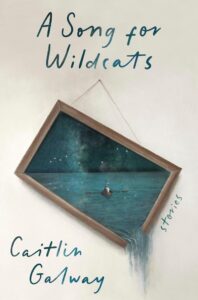
Everyone is a philosopher; this is a core sentiment of mine. Some are certainly more formal and exploratory in their reflection, but we all meet with life’s great abstractions, and we all carry doubt and curiosity. Most of us will, in one way or another, attempt to pin some logic to our grief, purpose to our existence, shape to our sense of self.
The characters in my collection, A Song for Wildcats, pull such introspection to the forefront of their experiences. Each story explores some form of grief, trauma, and intimacy while spanning distinctly different settings, from an Irish peninsula at the height of the Troubles, to the Corsican seafront during the 1968 student revolts. But they also squint through a metaphysical lens, and my characters (like myself) often find themselves fixated on unanswerable questions: What defines love and violence? How far back should blame extend? What’s the essence of self, especially if self is fluid, and how does one hold onto it?
“The Lyrebird’s Bell,” for example, follows the friendship between two young girls in the isolated bush of 1940s Australia. Facing a severe, lonely homelife, each girl crafts stories, often unsettling and fantastic ones, that are somehow more rational and less painful than the truth. As one girl is consumed by these fantasies, the other grows desperate to remain grounded in reality. In doing so, she begins to question what constitutes reality—and as no one person’s reality is definitive, whose versions are worthier, or more valid?
As I wrote the collection, I rediscovered a love of philosophy, particularly the works of Plato. (Even the title A Song for Wildcats is a little wink to Homer’s Iliad—due to what we’ll call an “enthusiasm” for ancient humanism.) It became an obsession—a healthy obsession, I would argue—which drove me to make dramatic shifts in my life. I gradually began to reconfigure my relationship with human interaction, identity, and the world around me—all of which led me wandering quietly through mountains, sitting alone in faraway villages, and more deliberately layering my work with metaphysical questions to which I’ve long been intuitively drawn. If grief does not leave us, when does it become wisdom? Why does suffering lead toward deeper empathy for some, and for others, a desire to harm?
However, I did not want to write a textbook, nor would I condescend to readers by assuming they required easy explanations. Instead, my hope was to offer stories in which the various layers—such as narrative, emotional, symbolic, and philosophical—connect patiently and meaningfully, so that one does not need to research ancient Greek philosophy, or Irish folklore, or twentieth-century existentialism, in order to be impacted by them. My characters are driven by a desire for connection and clarity, and it was important to me that the philosophical lens amplify each story’s heart, not clog it. These stories are my effort to capture, in my own small way, the peculiar human habit of stumbling, unwittingly, into transformation.
—
Caitlin Galway’s short story collection A Song for Wildcats has been featured as a must-read by the Globe and Mail and the Toronto Star, and named an Indigo Best Book of 2025. Her debut novel Bonavere Howl was a spring pick by the Globe and Mail, and her work has appeared in journals and anthologies across Canada, including Best Canadian Stories, EVENT, and Gloria Vanderbilt’s Carter V. Cooper Anthology, and on CBC Books.

August has been a busy travel month. My brain is mush, my body would like to stop sleeping in strange beds, and my cats cannot decide if they are more needy for attention or still pissed that I was gone. Here’s a Bubble and Squeek for you.
Awards: I did not win the Hugo award this year, but I’m not mad at who won in my category. Neil Clarke is incredibly talented and does good work. So, here’s my finalist certificate framed and hung. (I am seriously considering taking my two rocket pins to a local jeweler to see if he can turn them into really nice earrings.)
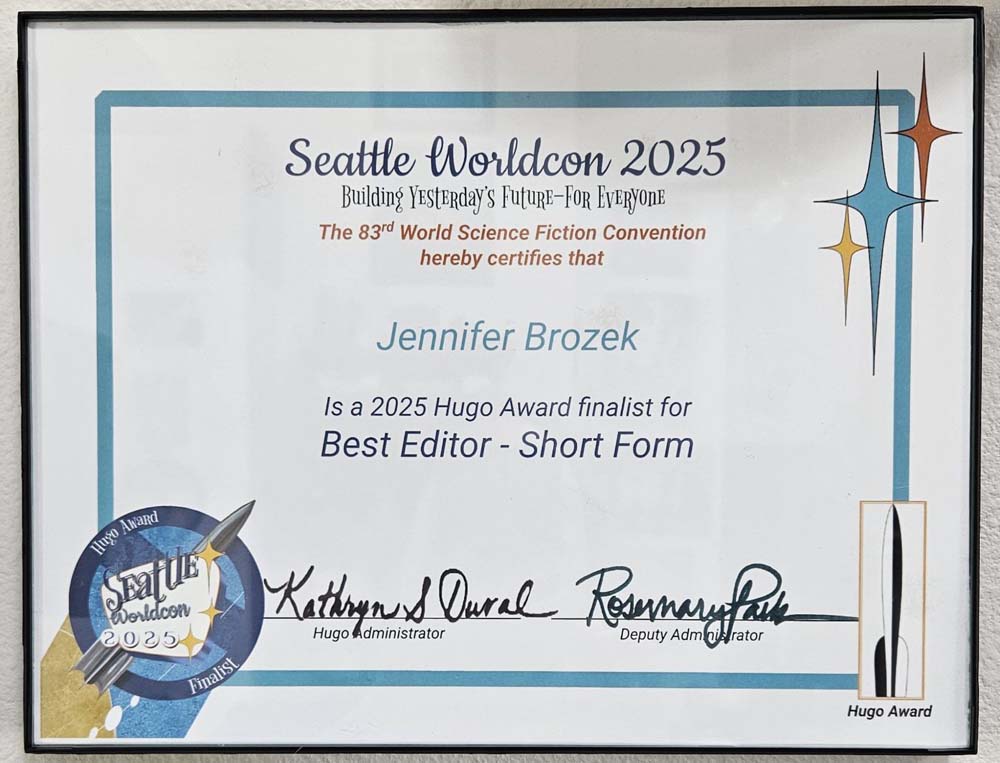
Blog: The end of a two year project. Dear Penpal, Belgium 1980 is over and done with. Gotta admit, I don’t regret doing Dear Penpal, but I won’t do it this way again.
eBay and Signed Books: If you would like signed books from me, we have them up on eBay. This will remain on eBay until all of my books are gone. All money goes to me.
Interview: Lindsey Byrd in Writing is Hard podcast. How to edit a book? With Jennifer Brozek. This was a really fun interview. (YT link)
Podcast: The Skiffy and Fanty Show, 832. Shin Kamen Rider (2023) — Righteous Kicks #10. Bug hybrids, evil organizations, and intense vertical kicks, oh my! Brandon O’Brien and Iori Kusano are joined by Jennifer Brozek to discuss 2023’s Shin Kamen Rider! I have many opinions.
Publication: Augment 3, Autumn 2083. Available now! Look at that cover. It’s gorgeous! The universal buy link is here.
Publication: “Praise for the Honored Dead” is Catalyst Game Labs’ free BattleTech fiction for the month of August! Get it now before it disappears and another story replaces it! (New free Shadowrun and BattleTech fiction on the first of each month.)
Support: As always… if you appreciate my work and would like to support me, I love coffee. I am made of caffeine. This is the quickest way to brighten my day.

It’s time for Worldcon! Here’s my schedule that doesn’t include any of the private meetings. Come see me. Say hello. (For the love of Pete, please come to my Thursday Table Talk. I know you need to sign up and must wait until the day before, but I don’t want to sit there alone.) I will be out and about. Feel free to wave or bring me a book to sign. Also, I will have books for sale at Northwest and Guests in the Dealers Hall.
=====14 Aug, Thursday=====
=====15 Aug, Friday=====
=====16 Aug, Saturday=====
=====14 Aug, Thursday=====
12-1pm, Table Talk: Jennifer Brozek, Room 430
These used to be called kaffeklatches. Have an intimate discussion (up to six participants) with your favorite creators. (Advance sign-up is required.)
Jennifer Brozek
2-4pm, Volunteered to Man the Brisbane 28 Worldcon Table: Fan Table 42
4:30-5:30pm, Writing for Franchises (Workshop lecture), Room 330
How do you get started writing for someone else’s universe? In this workshop, you’ll learn how to take inventory of your skills and contacts and then use them to secure writing gigs with established properties. (Advance sign-up is required.)
Jennifer Brozek
7:30-8:30pm, How to Vet Fictional Society Rules, Room 423-424
You can’t break rules until you make them. All fictional societies need an internally logical legal foundation, and understanding it is a key component of writing compelling, credible science fiction. It is the developmental editor’s job to make sure the rules make sense. Panelists will discuss how they vet social and legal structures for their clients’ novels and how breaking/bending these rules can create the story beats that keep readers turning pages.
Jennifer Brozek (M), Alma Alexander, James R. Wells, Joseph Brassey, Sarah Chorn
=====15 Aug, Friday=====
9-10am, Outlining to Sell, Room 423-424
Learn how to create a compelling outline to sell your idea to an intellectual property (IP) or media tie-in acquisition editor. Many tie-in authors have successfully sold novels from outlines… and been paid advances before typing a single line of prose. Learn how to do this from our experienced panelists. Tips from this panel can be used for selling your original completed novel or nonfiction book as well.
A. J. Hackwith (M), Gwendolyn N. Nix, Jennifer Brozek, Rebecca Roanhorse, Rosemary Jones
7:30-8:30pm, Getting the Science Right, Even if It’s Magic, Room 423-424
How important is it for authors to get their science right, in science fiction and fantasy? What does “right” even mean for speculative fiction? How is genre convention tied into those answers? Does science have a role in magic?
Joshua Palmatier (M), Christine Taylor-Butler, Jennifer Brozek, Scott H. Andrews, Max Goller
=====16 Aug, Saturday=====
10-11:30am Signing at Northwest and Guests table, in the Dealers Hall
12-1pm, Where Do Editors Come From?, Room 321
Book editing is one of the last redoubts of the un-credentialed autodidact. While there are training programs for book-editing skills, most book editors come into the job with an enormous diversity of backgrounds. Many editors are successful without any specific training or academic credentials. How does the novice editor become a success in such an unregulated industry? How would they even start to become a professional editor?
Sheila Williams (M), Emily Hockaday, Trevor Quachri, Jennifer Brozek, Carl Engle-Laird
2-2:30pm, Reading: Jennifer Brozek, Room 429
“Citizen, Scion, Savior, Singularity.” Sophia Nyland risks all to make the discovery of a lifetime. After she breaks through what is supposed to be an impenetrable barrier, she discovers that her world is much larger than she thought it was—as is her place within it.
Jennifer Brozek
6:30 pm, Hugo Reception, Signature Room
8:00pm, Hugo Award Ceremony, Ballroom 1

On July 23rd, the day that Hugo voting closes, I posted on social media that “Less than six hours left before we all become Schrödinger’s Hugo award winners. Either we have already won or lost.” This is the period between the end of voting and the announcement of the winners. During that liminal time, we are both Hugo winners and Hugo losers.
I’ve used my Hugo nomination to treat myself to some things I don’t normally buy (a couple gowns, some jewelry, a tiara…), but I kept thinking about that phrase “Schrödinger’s Hugo winner.” So, I decided to support one of my favorite artists, Alina Pete, and commissioned some artwork at Gen*Con.

Isn’t he the best? Now, I will always have “Schrödinger’s Hugo winner cat” on my wall. I’m also gifting it to all of the Hugo Award 2025 finalists (as well as future Hugo finalists when they, too, become “Schrödinger’s Hugo winner”) to be amused by.
You may use the image for blogposts and such as long as you credit the artist, Alina Pete (alinapete.bsky.social or https://linktr.ee/alinapete) on the post.
Sometimes, you just have to treat yourself like you would your best friend.

It’s been five years since I stepped into the BattleTech arena as a writer. Over ten since I wrote my award winning YA BattleTech novel, The Nellus Academy Incident. I’ve never written a one-off BattleTech short story. Now I’ve written two…and one of them is currently available for free on the Catalyst Game Labs “free download” page.
For August only, “Praise for the Honored Dead” is available for free, and it takes place after about a week after the events of The Nellus Academy Incident, and thus will have many spoilers for the novel. Gotta admit, I’m in love with the cover of this short story.
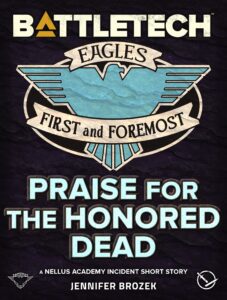
“GET READY FOR THE WORST TIME OF YOUR LIVES.”
The press is calling it “The Nellus Academy Incident.” For the cadets that fought against and survived a brutal mercenary assault intended to spark a war between the Free Worlds League and the Lyran Alliance, it was only the beginning.
Now, they must navigate the gauntlet of appearing in public…and dealing with what happened on Phobos. Barely days past risking their lives—and seeing their fellow classmates sacrifice themselves for the others—the four remaining cadets must come to terms with what has happened…and lay their friends to rest while under the pitiless glare of government cameras that record their every move…
Rereading The Nellus Academy Incident more than 10 years after I wrote it was interesting. I had some genuine moments of “Oh, that’s good” and “Damn, I don’t remember writing that. It really works.” Of course, I had a couple moments of “I could’ve written that better.” But not many.
It was like bumping into an old friend after a long absence and realizing, yeah, they were cool and you’re glad you know they and met up again. There is joy in realizing that, yeah, you do do good work. I hope you enjoy returning to the Nellus Academy for a brief dip back into the cadets’ lives.

Two years ago, I contacted Rem from Rem Alternis and asked her if we could meet at Gen Con to talk about having her company run the Kickstarter for a passion project I wanted to create. We met. We agreed to everything. And ran the Kickstarter in March of 2024. It funded and as of July 27, 2025, that Kickstarter is over, done, and things involving it mailed/fulfilled.
Dear Penpal, Belgium 1980 was quite the endeavor—telling a MG horror story over a year in 24 physical letters. Yep. If I’m gonna do a Kickstarter, let’s do it on Hard Mode. Next time, if there is one, I’ll do something easy like a novella series. I don’t regret doing Dear Penpal, but I won’t do it this way again.
Here’s some fun facts the Husband put together for the celebration party. I thought they were too good not to share.
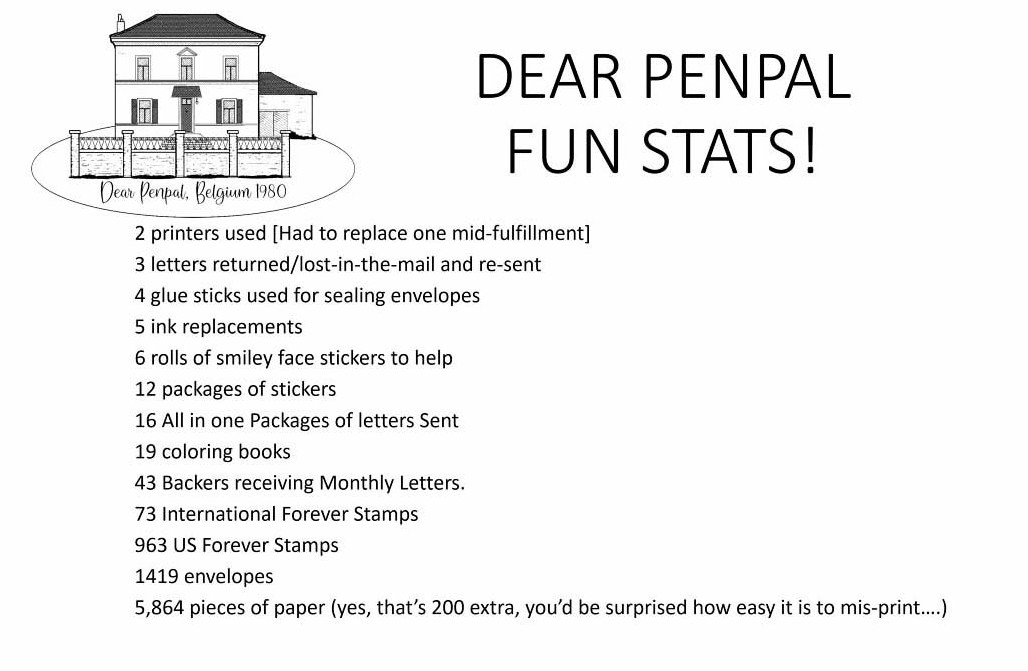
So, the final question that has been asked of me… “Will there be any more Dear Penpal stories?”
The answer is maybe. I’ve got an idea for a series of novellas around it. 3-4 more in the series, jumping years in-between each one. Each one would still be in letters. Probably 2 each month, but put together as a novella. This is a nascent idea, kicking around the different places I’ve moved to and interesting things that could’ve happened to fictional Jennifer who can see ghosts: Pennsylvania 1984 (teen), California 1989 (senior in HS), Oregon 1992 (college), Washington 2004 (adult).
Yeah. Maybe. If the idea still calls to me next year, I might chase it down. We’ll see.


Jennifer Brozek is a multi-talented, award-winning author, editor, and media tie-in writer. She is the author of Never Let Me Sleep and The Last Days of Salton Academy, both of which were nominated for the Bram Stoker Award. Her YA tie-in novels, BattleTech: The Nellus Academy Incident and Shadowrun: Auditions, have both won Scribe Awards. Her editing work has earned her nominations for the British Fantasy Award, the Bram Stoker Award, and multiple Hugo Awards. She won the Australian Shadows Award for the Grants Pass anthology, co-edited with Amanda Pillar. Jennifer’s short form work has appeared in Apex Publications, Uncanny Magazine, Daily Science Fiction, and in anthologies set in the worlds of Valdemar, Shadowrun, V-Wars, Masters of Orion, Well World, and Predator.
Jennifer has been a full-time freelance author and editor for over seventeen years, and she has never been happier. She keeps a tight schedule on her writing and editing projects and somehow manages to find time to teach writing classes and volunteer for several professional writing organizations such as SFWA, HWA, and IAMTW. She shares her husband, Jeff, with several cats and often uses him as a sounding board for her story ideas. Visit Jennifer’s worlds at jenniferbrozek.com or her social media accounts on LinkTree.